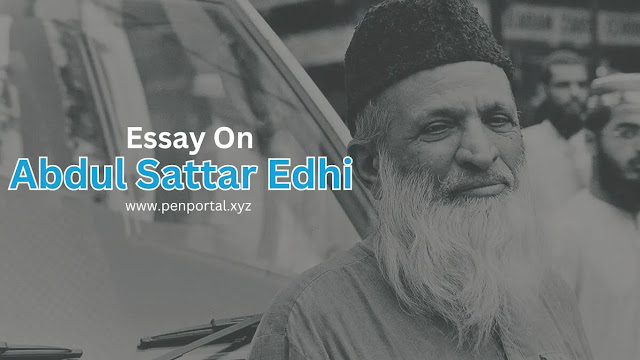This post is about an Essay on Abdul Sattar Edhi in English for FSC/Ics/Fa students. It is a critical essay for Class 10, Class 12, and graduation students. They write it in their annual English paper. A good essay can help them get good marks and improve their rank. You can also see the English Essay Topics.
You can use this essay for different topics, such as Abdul Sattar Edhi's Essay in English, ABDUL SATTAR EDHI-An Angel On Earth, and My Favourite Personality — Abdul Sattar Edhi.
Essay On Abdul Sattar Edhi (200 Words)
Abdul Sattar Edhi was a philanthropist and humanitarian from Pakistan who founded the Edhi Foundation, one of the country’s largest welfare organizations. He was born on January 1, 1928, in Bantva, British India, and passed away on July 8, 2016, in Karachi, Pakistan.
Edhi dedicated his life to serving humanity and helping those in need, regardless of their caste, creed, or religion. He started his philanthropic work at a young age by providing medical aid and shelter to the poor and homeless. Later, he expanded his services to include ambulances, orphanages, and shelter homes.
Over the years, Edhi’s services expanded to include disaster relief, emergency services, and support for the mentally ill. He also established a free nursing home, clinics, and blood banks; his foundation is known to have helped millions of people in Pakistan.
Edhi’s contribution to humanity was widely recognized and honoured nationally and internationally. He received numerous awards for his humanitarian work, including the Nishan-e-Imtiaz, Pakistan’s highest civilian award.
Abdul Sattar Edhi’s legacy inspires generations to serve humanity selflessly. He was a true hero and a role model for millions worldwide, reminding us of the power of compassion and empathy in creating a better world for all.
Essay On Abdul Sattar Edhi (500 Words)
Abdul Sattar Edhi, revered as Pakistan’s greatest humanitarian, exemplifies the transformative power of compassion and service. Born on January 1, 1928, in Bantva, Gujarat, British India, Edhi’s early life was marked by simplicity and empathy, traits that would define his remarkable journey towards establishing the renowned Edhi Foundation.
Humble Beginnings and Early Influences
Edhi’s journey began in a modest household where he imbibed values of empathy and social responsibility from his parents. His exposure to the suffering of others during the tumultuous partition of India in 1947 deeply impacted him, laying the foundation for his lifelong commitment to humanitarianism. Starting as a street vendor and later working as a commission agent for cloth merchants, Edhi’s firsthand experiences with poverty and adversity fueled his determination to alleviate the plight of the marginalized.
The Establishment of the Edhi Foundation
In 1951, Abdul Sattar Edhi established the Edhi Welfare Trust with a mere Rs. 5,000 ($50). This initial step marked the beginning of what would eventually become Pakistan’s most extensive network of social services. The Edhi Foundation, established later, expanded rapidly under Edhi’s visionary leadership, encompassing a wide array of services including healthcare, orphanages, shelters, and rehabilitation centers.
Key Principles and Philosophies
At the heart of Abdul Sattar Edhi’s work were several key principles and philosophies that guided his life’s mission:
- Humanity First: Edhi believed fervently in the inherent dignity of every individual, regardless of their background or circumstances. His philosophy emphasized the primacy of serving humanity above all else.
- Universal Compassion: He practised a non-discriminatory approach, providing care and assistance without regard to religion, ethnicity, or social status. Edhi’s ambulances and shelters were open to anyone in need, reflecting his commitment to universal compassion.
- Selfless Service: Edhi lived a simple life, devoid of personal luxuries, and dedicated himself entirely to the service of others. His humility and devotion to his cause earned him the admiration and respect of millions.
Impact and Legacy
Abdul Sattar Edhi’s impact transcended national borders, earning him international recognition and numerous accolades, including the Ramon Magsaysay Award for Peace and International Understanding in 1986. His legacy continues to inspire generations of activists and philanthropists worldwide, symbolizing the transformative potential of individual commitment to social justice and humanitarian causes.
Conclusion
In conclusion, Abdul Sattar Edhi’s journey from humble beginnings to establishing the Edhi Foundation stands as a testament to the power of compassion and service. His unwavering dedication to uplifting the disadvantaged and his adherence to principles of universal humanity have left an indelible mark on Pakistan and the world. Abdul Sattar Edhi’s life remains a beacon of hope and inspiration, reminding us all of the profound impact one individual can have in making the world a better place.



















COMMENTS